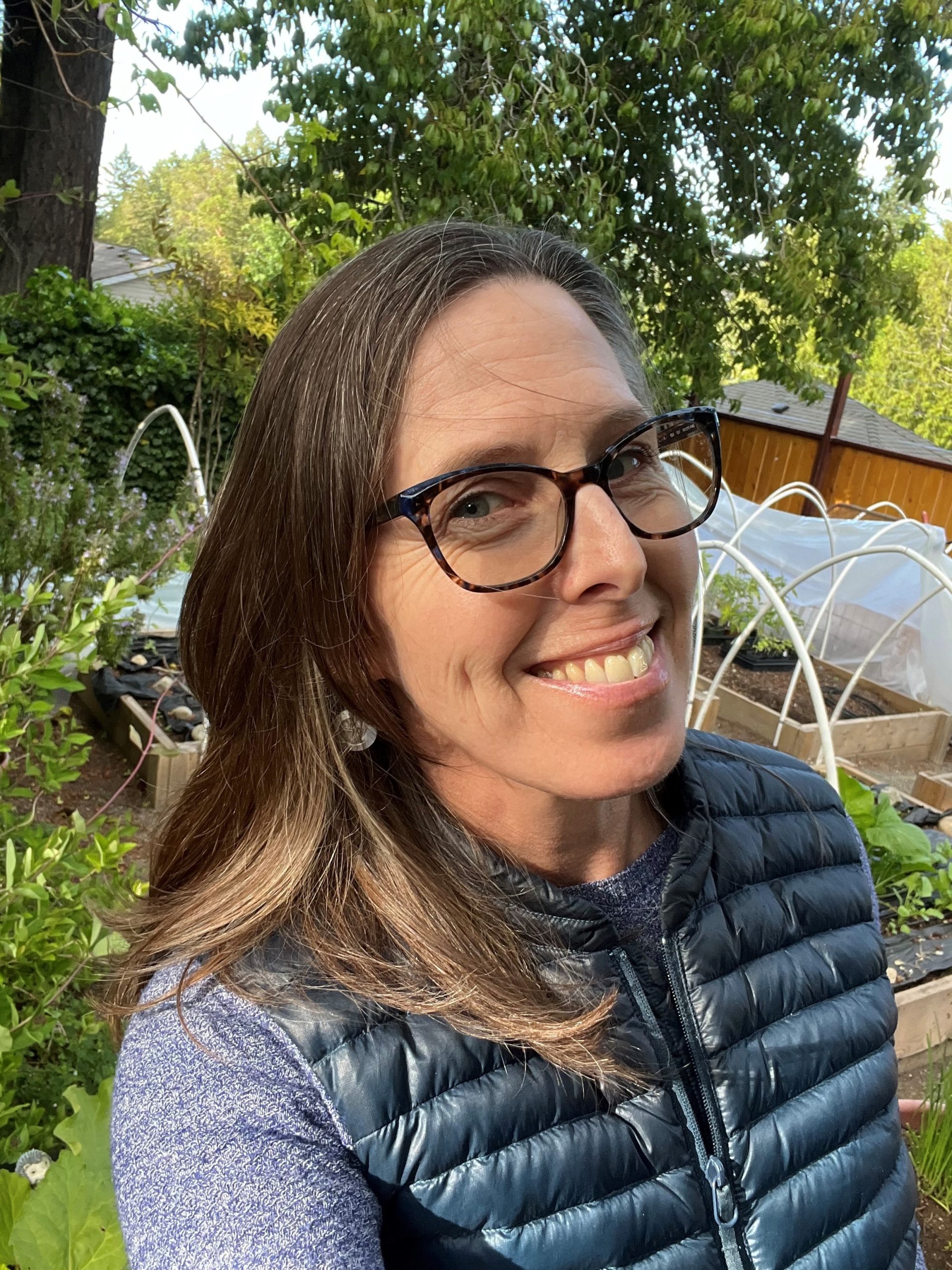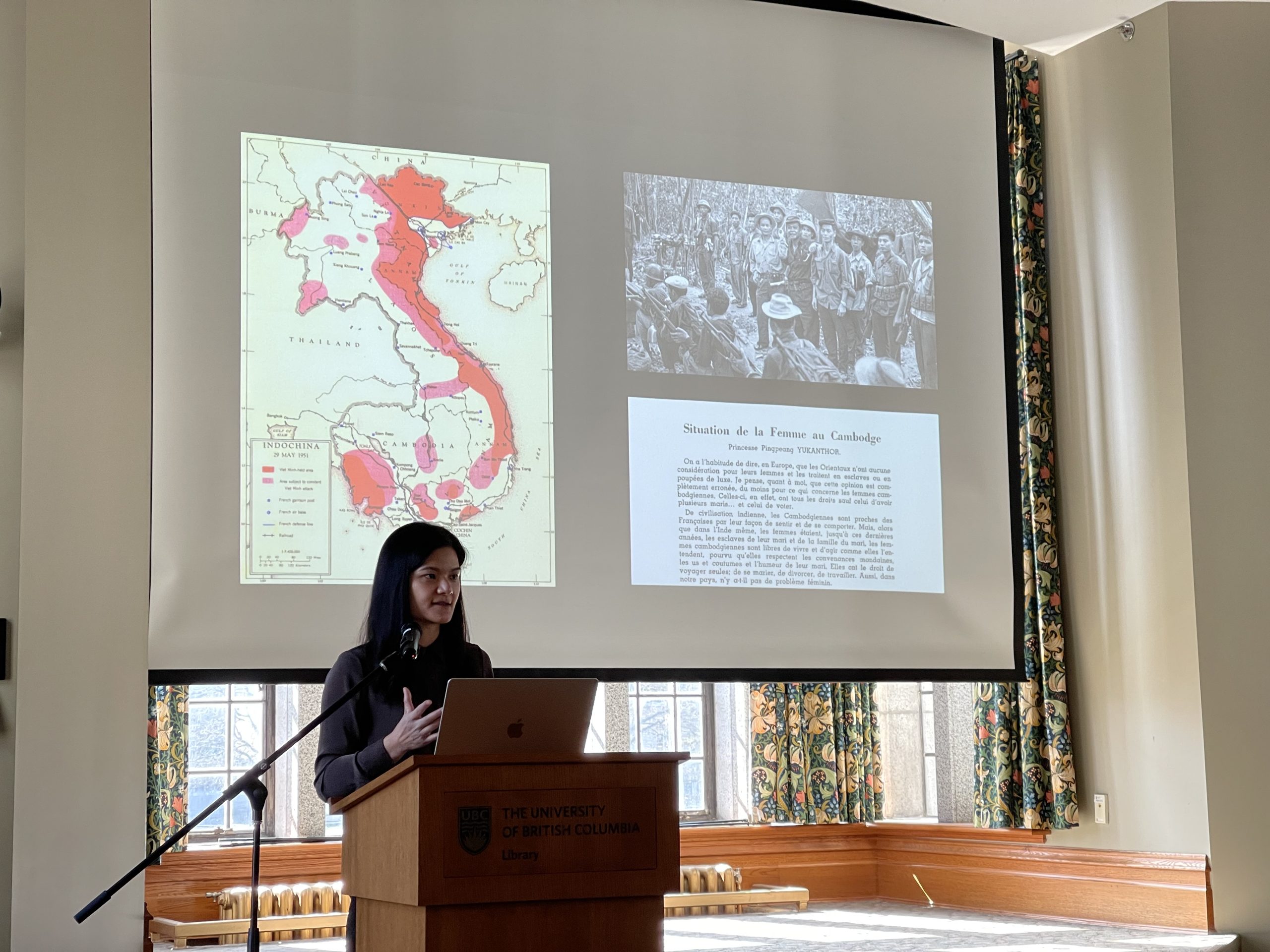

Cindy Ewing examines the complicated relationship between the 1947 Asian Relations Conference and the Indochinese anti-colonial guerilla forces. (image credits: Quinton Huang)
What does it mean to think through a region? As the Centre for Southeast Asian Research (CSEAR) marked a year of significant anniversaries for Southeast Asia—70 years since the 1955 Bandung Asian-African Conference, 50 years since the end of the Vietnam War, and 25 years since the 1999 Independence Referendum for Timor-Leste—we thought it was important to see Southeast Asia not just an area to be studied, but also a lens through which to view our world. Thinking through Southeast Asia meant engaging, collaborating with and uplifting community partners who do the hard work of preserving and building Southeast Asian heritage, culture, ideas, and communities.
This year’s flagship event series, Histories of Anti-Colonial Thought in Southeast Asia, highlighted the work of four emerging scholars whose recent or forthcoming monographs challenge our assumptions about how Southeast Asians have seen the world. Generously co-sponsored by the Global Histories of Anti-Colonial Thought cluster and the UBC Myanmar Initiative, the series reconsidered the meaning of anti-colonial nationalism. Kevin Pham (University of Amsterdam) described the unique contributions of Vietnamese intellectuals in framing dignity and shame as essential tools for anti-colonialism. Kisho Tsuchiya (Kyoto University) and Theara Thun (HKU) demonstrated how Cambodian writers and East Timorese political actors emplaced and narrated their histories and geographies in the face of global transformations. Cindy Ewing (University of Toronto) brought us into the postcolonial moment by analyzing the triumphs and discontents of the 1947 Asian Relations Conference, particularly from the perspectives of the Vietnamese, Burmese and Indonesian delegations.
Aside from this event series, we also welcomed three scholars from the Australian National University—Jane Ferguson, Marcus Mietzner, and Li Tana—to speak about (respectively) the social history of Burmese cinema, the legacy of the Jokowi presidency in Indonesia, and the maritime connections of precolonial Vietnam. In conjunction with Jane Ferguson’s lecture, we were honored to host the first North American screening of Tender are the Feet, a recently restored, award-winning 1972 Burmese film about the performing arts.

Kevin Pham speaks about his new book The Architects of Dignity, (image credits: Quinton Huang)
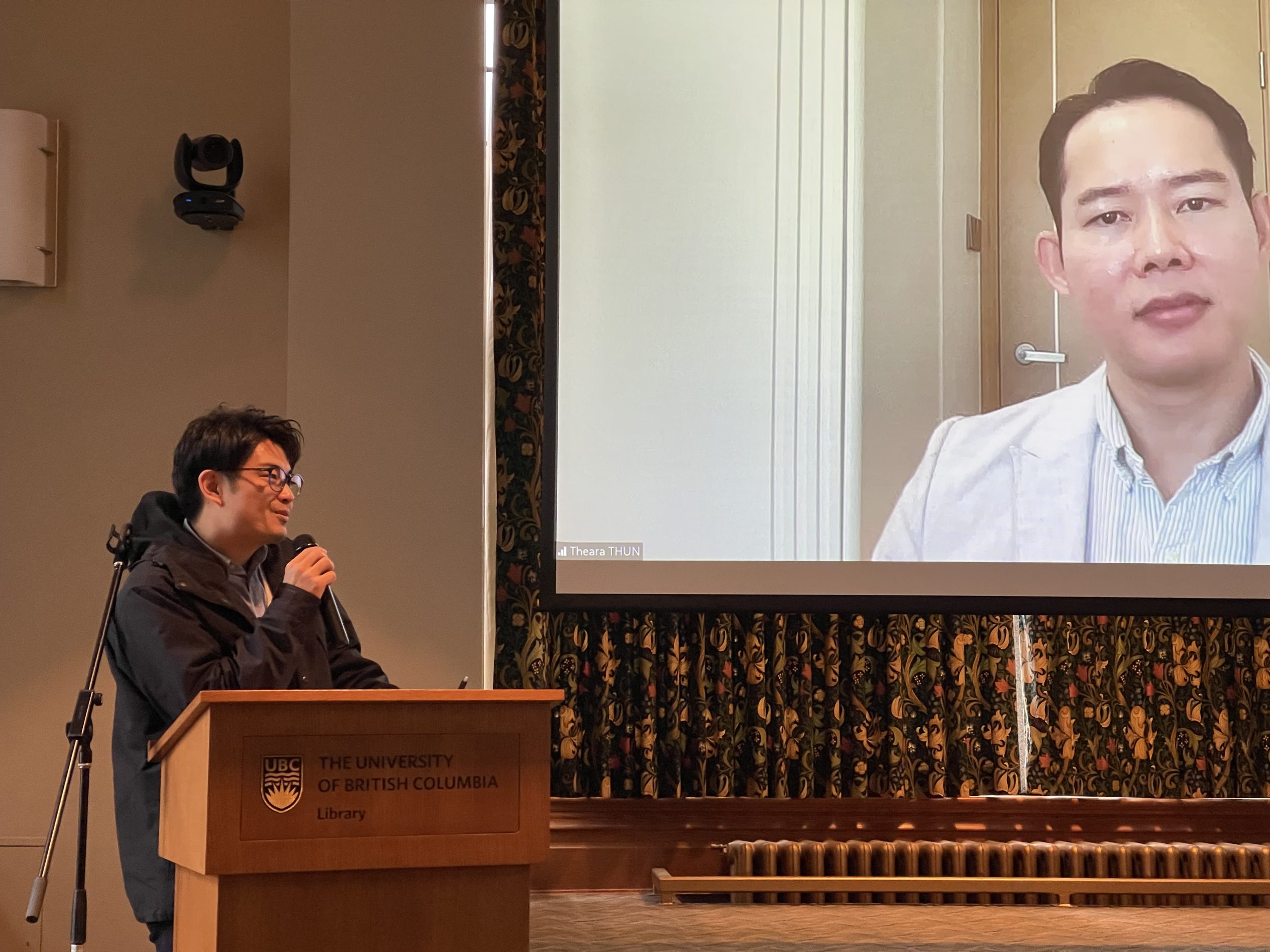
Kisho Tsuchiya (L) and Theara Thun (R) reflect on the new generation of Southeast Asian intellectual historians. (image credits: Quinton Huang)

Cindy Ewing examines the complicated relationship between the 1947 Asian Relations Conference and the Indochinese anti-colonial guerilla forces. (image credits: Quinton Huang)
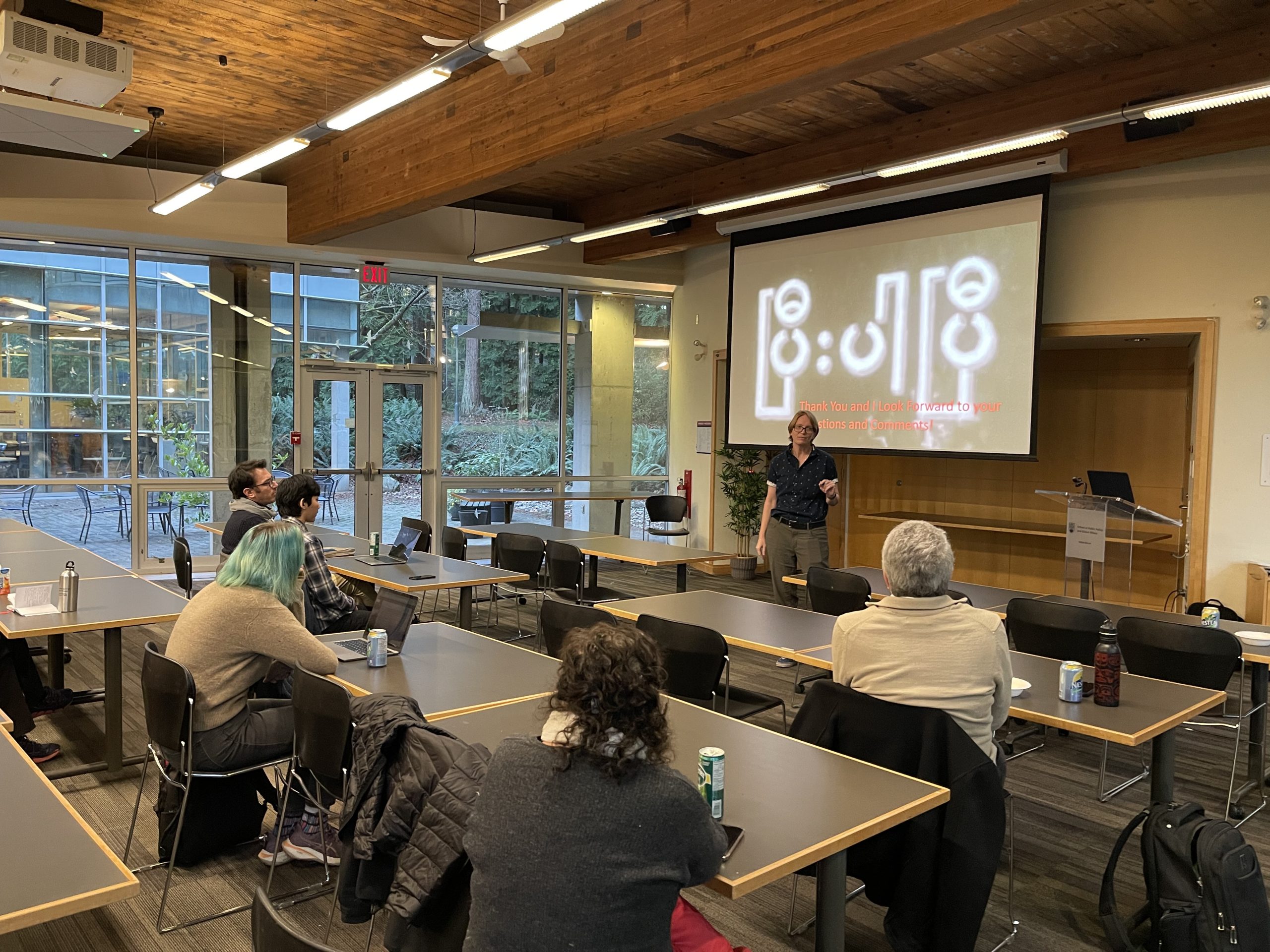
Jane Ferguson fields questions after a stimulating overview of Burmese cinematic history. (image credits: Quinton Huang)
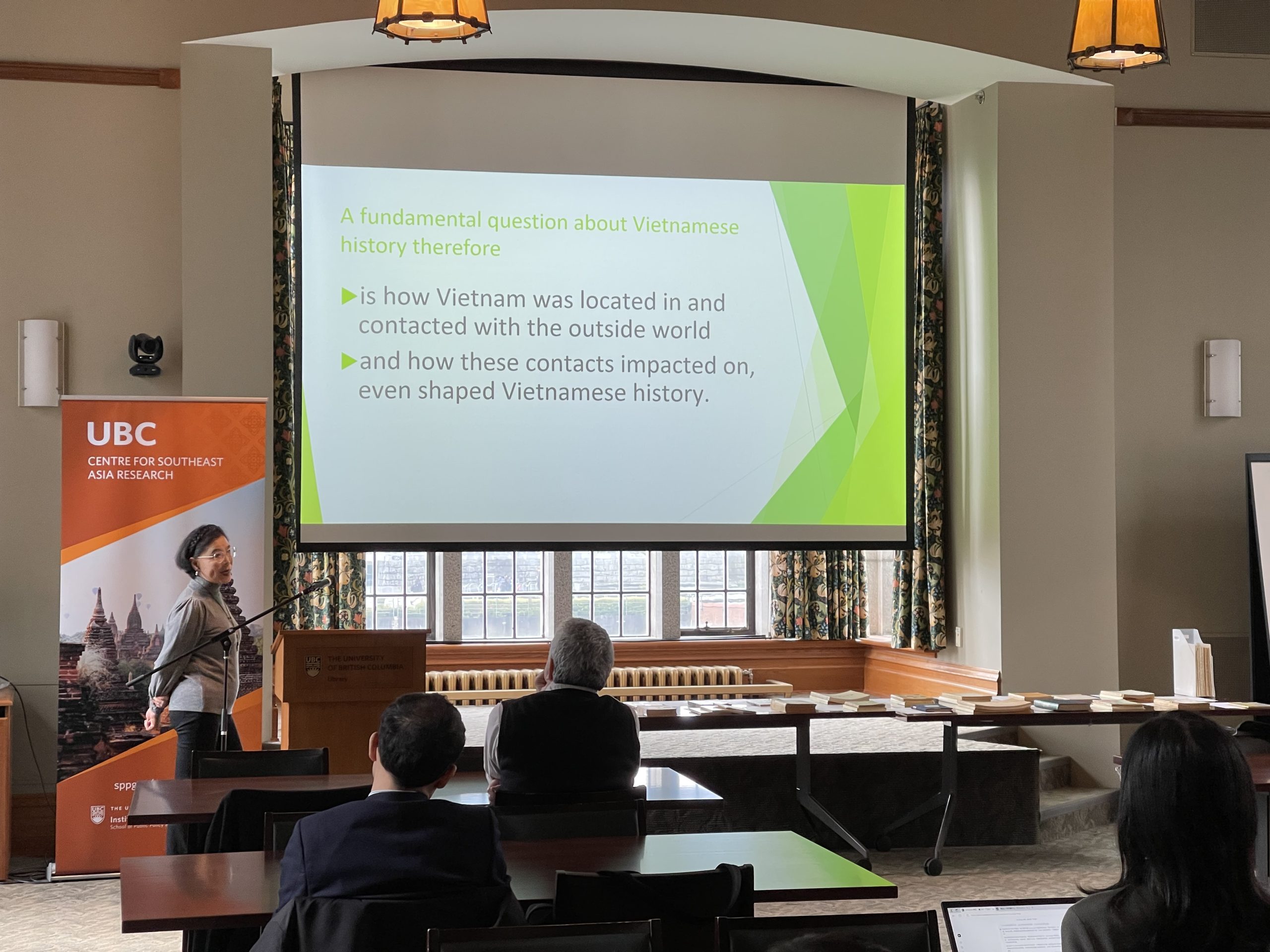
Li Tana asks the audience to globalize their understanding of Vietnamese history from the perspective of the ocean. (image credits: Quinton Huang)
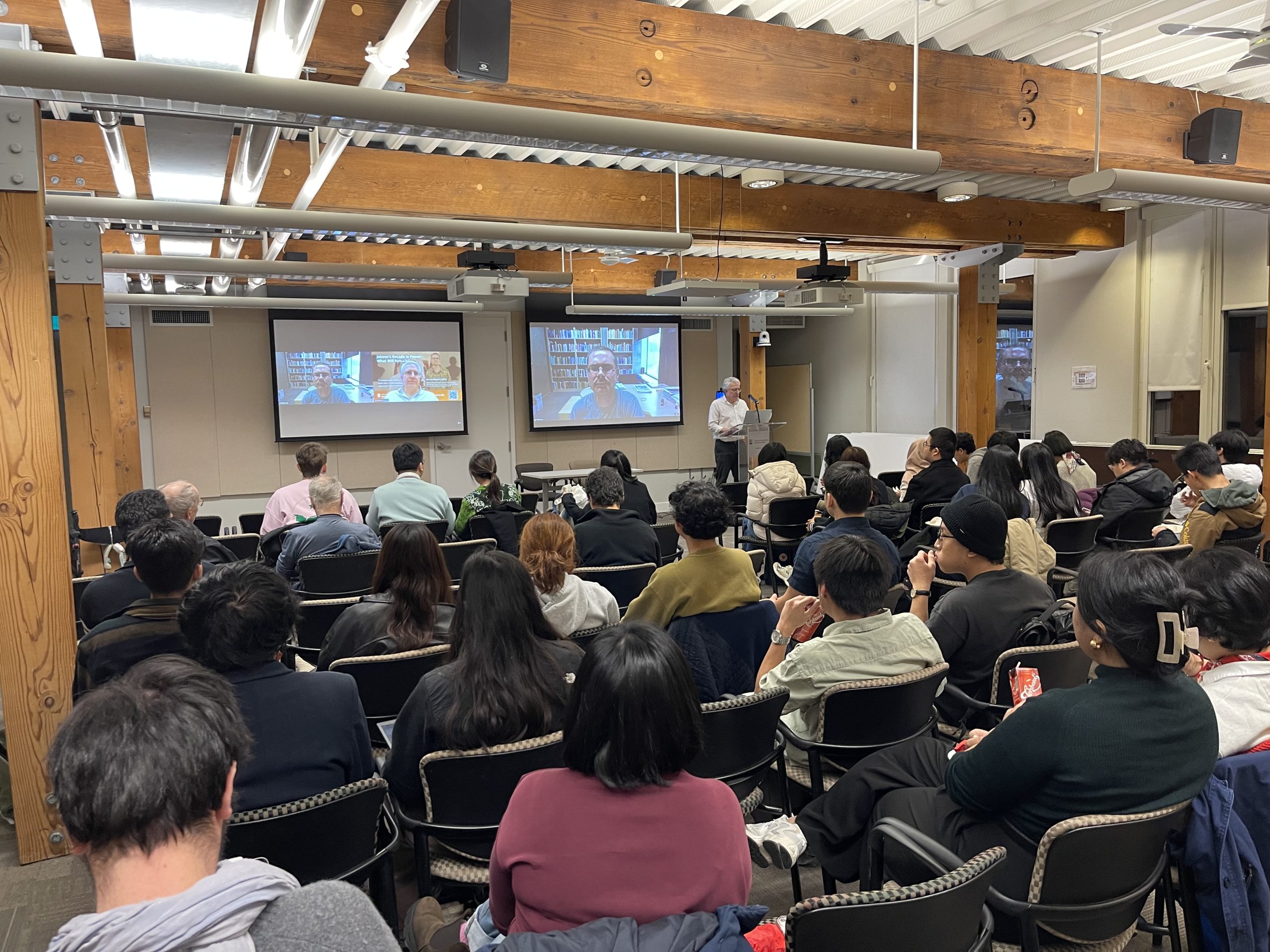
Director John Roosa (podium) introduces Marcus Mietzner (screen) to a full house of students, faculty and community members (image credits: Quinton Huang)
CSEAR broke new ground this year by collaborating with partners at UBC to highlight the University’s expertise in Southeast Asia. Our CSEAR fellows Sheila Suredja, Difa Ramandhanty, and Dom Imnamkhao worked with the Centre for Business Law and the Centre for Asian Legal Studies at the UBC Allard Law School to convene a roundtable on Canada-ASEAN relations amidst new geopolitical realities under the second Trump administration. CSEAR fellows and associates were also privileged to tour the Southeast Asian collections of the Beaty Biodiversity Museum and the Museum of Anthropology, courtesy of Beaty Manager of Exhibitions Derek Tan and MoA Asia Curator Fuyubi Nakamura. The visit to the Beaty Museum spawned a collaboration organized by CSEAR fellow Rizki Septiani that brought together Indonesian graduate students for a roundtable discussion on Indonesian environmental and biodiversity policies. The event culminated with an Indonesian plant and coral collection exhibition from the Beaty’s Vascular Plant Collections Curator Linda Lipsen. In partnership with the Koerner Library and librarian Abirami Muthukumar, we also exhibited the Alexander Woodside Collection of pre-1975 Vietnamese books, focusing on unique volumes and editions found nowhere else in Canada.
Beyond the University, we were proud to engage broader communities in the Lower Mainland and throughout North America in thinking through Southeast Asia. In partnership with the Graduate Education and Training on Southeast Asia (GETSEA) consortium, CSEAR participated in two simulcast screenings of significant documentaries from Thailand and Indonesia, joining dozens of other North American institutions in dialogue with their directors. In November, we hosted a community book launch for Ingat, an anthology of migrant worker literature from Hong Kong, alongside Centre for Migration Studies visiting scholar Julie Ham and several civil society groups in Hong Kong, including be/longing and the Migrant Writers of Hong Kong. CSEAR fellow Angel Bella will continue collaborating with MWHK and be/longing while partnering with Natalie De Los Santos of the Filipino Canadian Book Festival to facilitate a workshop inspired by Ingat at the UBC Learning Exchange in the Downtown Eastside in the future. In March, we also welcomed Rappler journalist Pia Ranada, who delivered the 2024 Marshall McLuhan Fellow (Philippines) lecture on “Building Journalism Around Community.” Organized by CSEAR associate Allen Baylosis and sponsored by the Centre for the Study of Democratic Institutions and the Gender, Race and Social Justice Institute, the lecture not only highlighted shared challenges and potential solutions for journalism in the Philippines and Canada, but also spotlighted the Filipino student organizations UBC Kababayan and Sulong UBC.

Sheila Suredja (first from left) introduces a distinguished roundtable of Canada-ASEAN experts, including Luthfi Dhofier (second), Tommy Koh (third), Hema Nadarajah (fourth), Dom Imnamkhao (fifth), Difa Ramandhanty (sixth) and Yves Tiberghien (not pictured). (image credits: Quinton Huang)
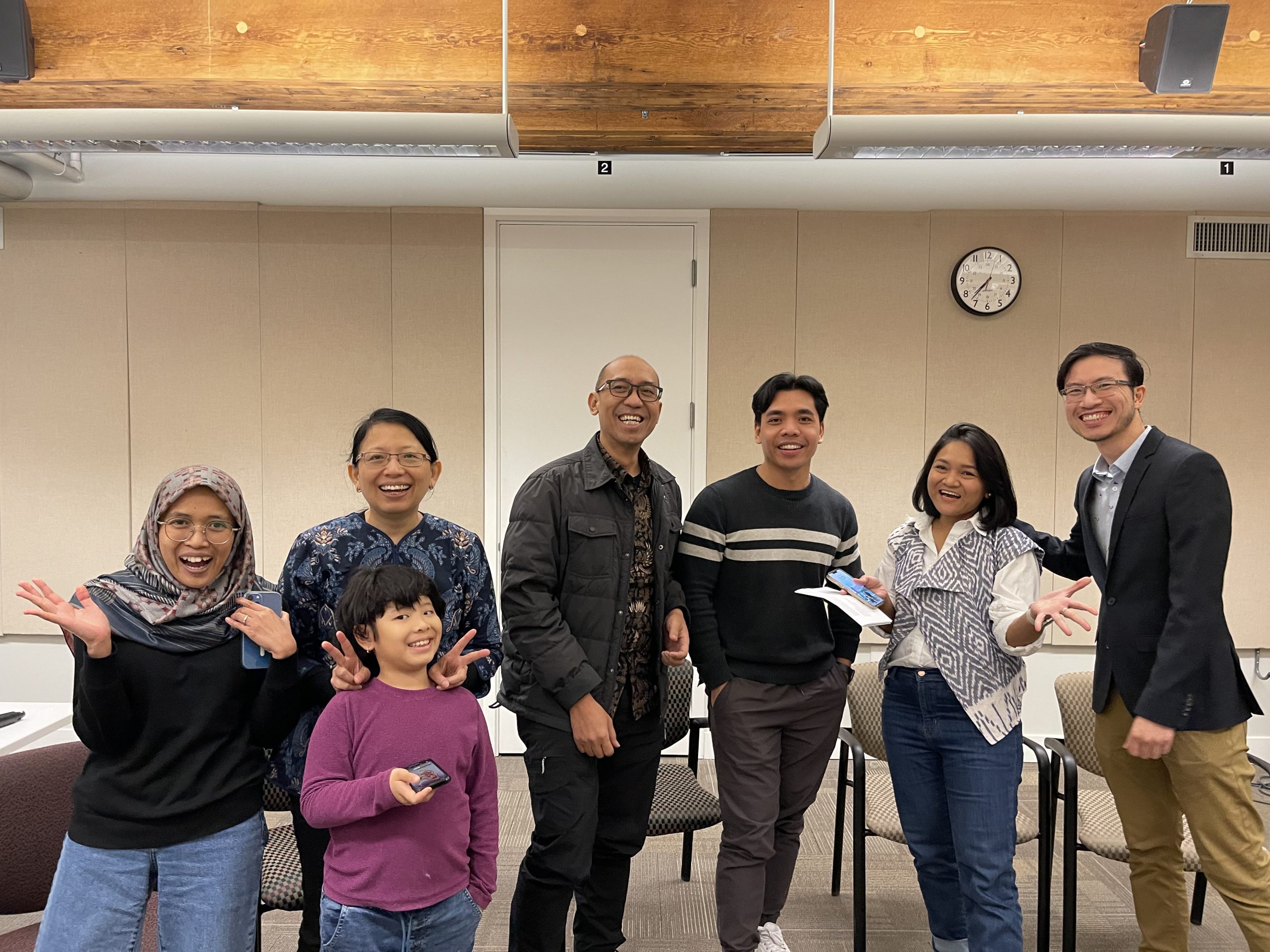
A successful roundtable, "From Landscapes to Seascapes: The future of Indonesia's environmental policies," celebrates with a silly photo. From left to right: Seni Senjaya, Shinitia Arwida (and child), M. Erdi Lazuardi, Muh Syukron, Rizki Septiani, and Derek Tan. (image credits: Quinton Huang)
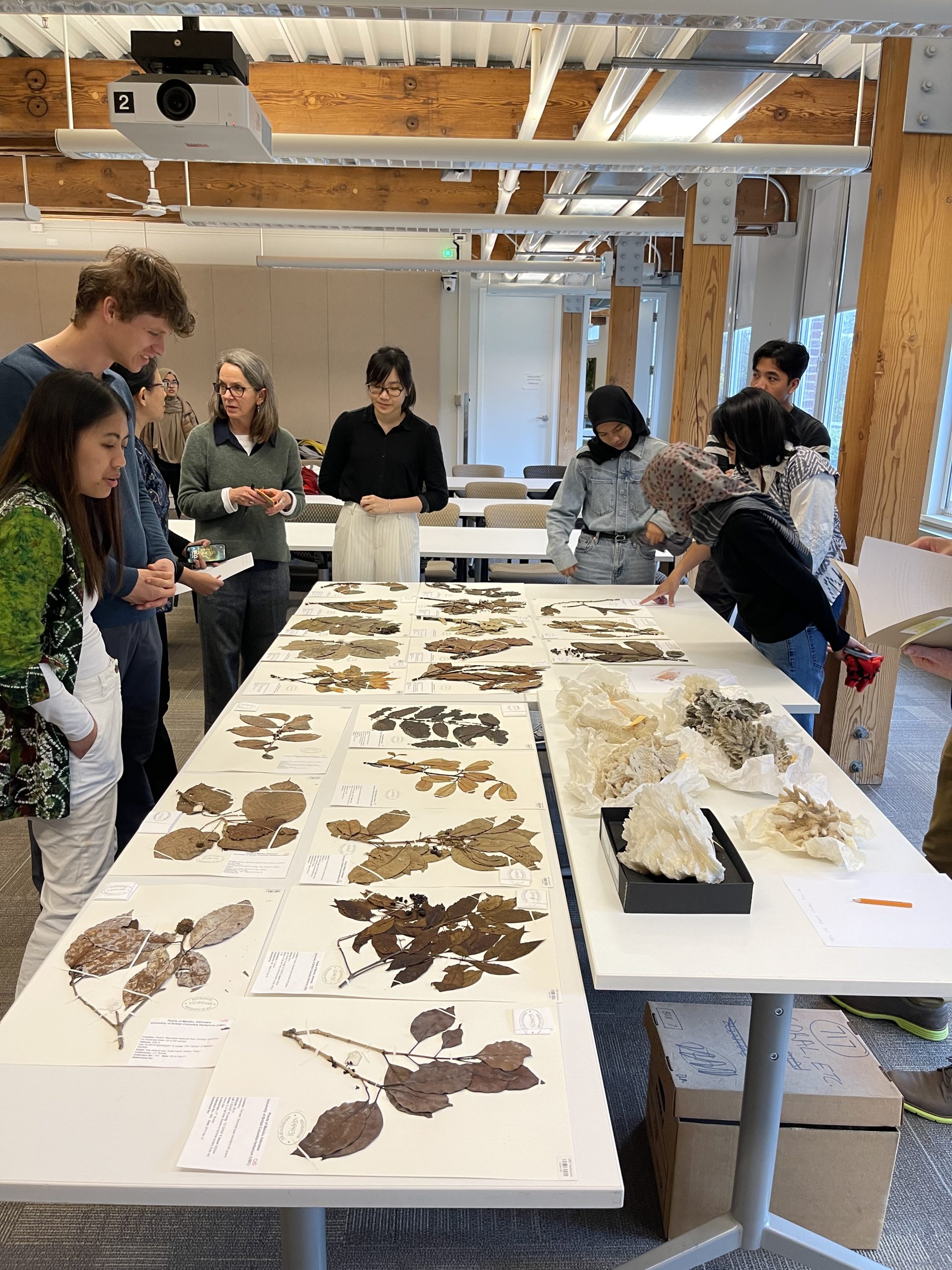
Linda Lipsen (second left from center), Collections Curator for Vascular Plants at the Beaty Biodiversity Museum, and her collections assistant Mandy (left from center) chat with participants about plant and coral specimens gathered in Indonesia. (image credits: Quinton Huang)
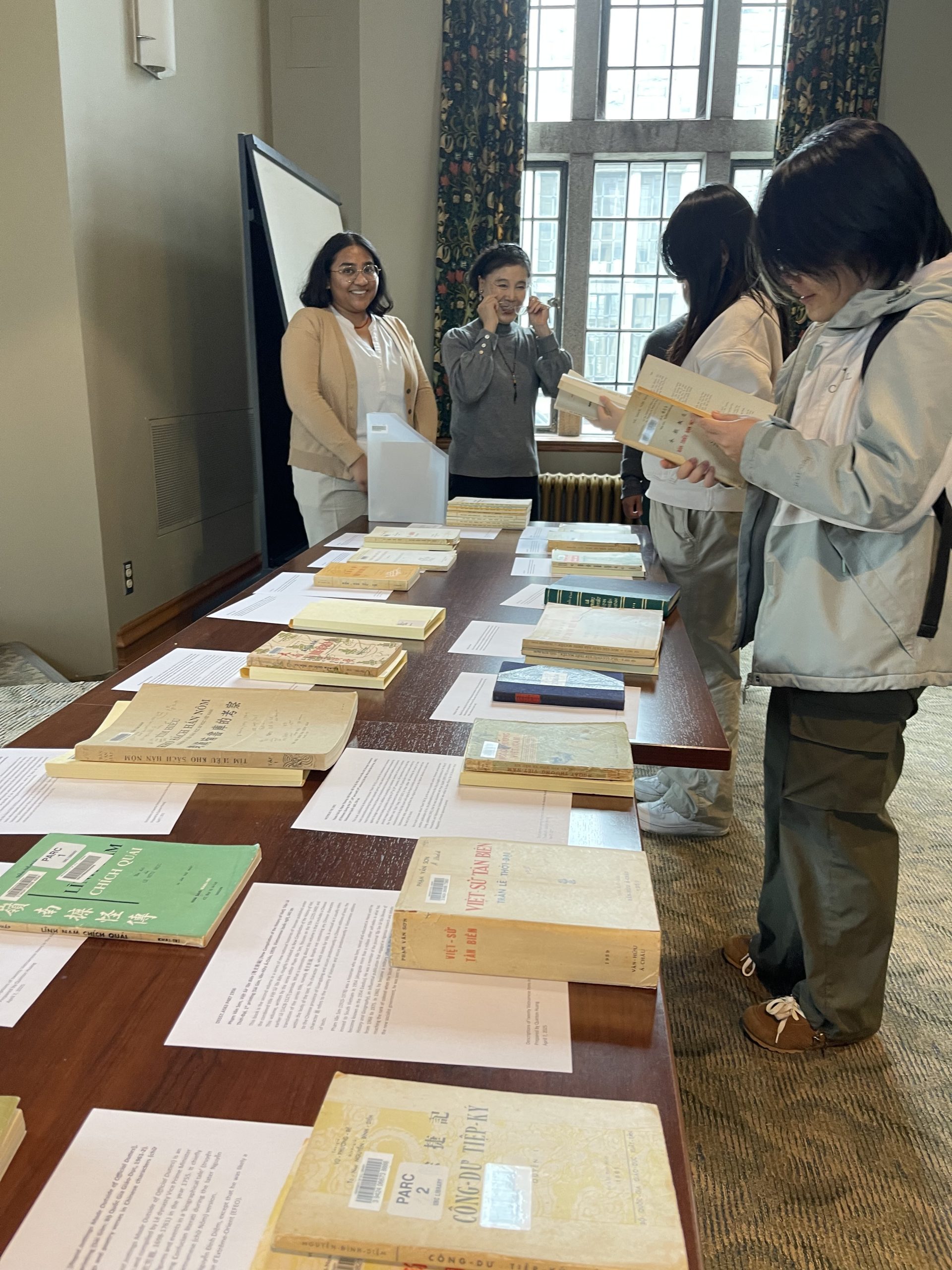
Abirami Muthukumar (first from left) and Li Tana (second from left) watchfully gaze over participants examining pre-1975 Vietnamese books from the Alexander Woodside Collection (image credits: Quinton Huang)
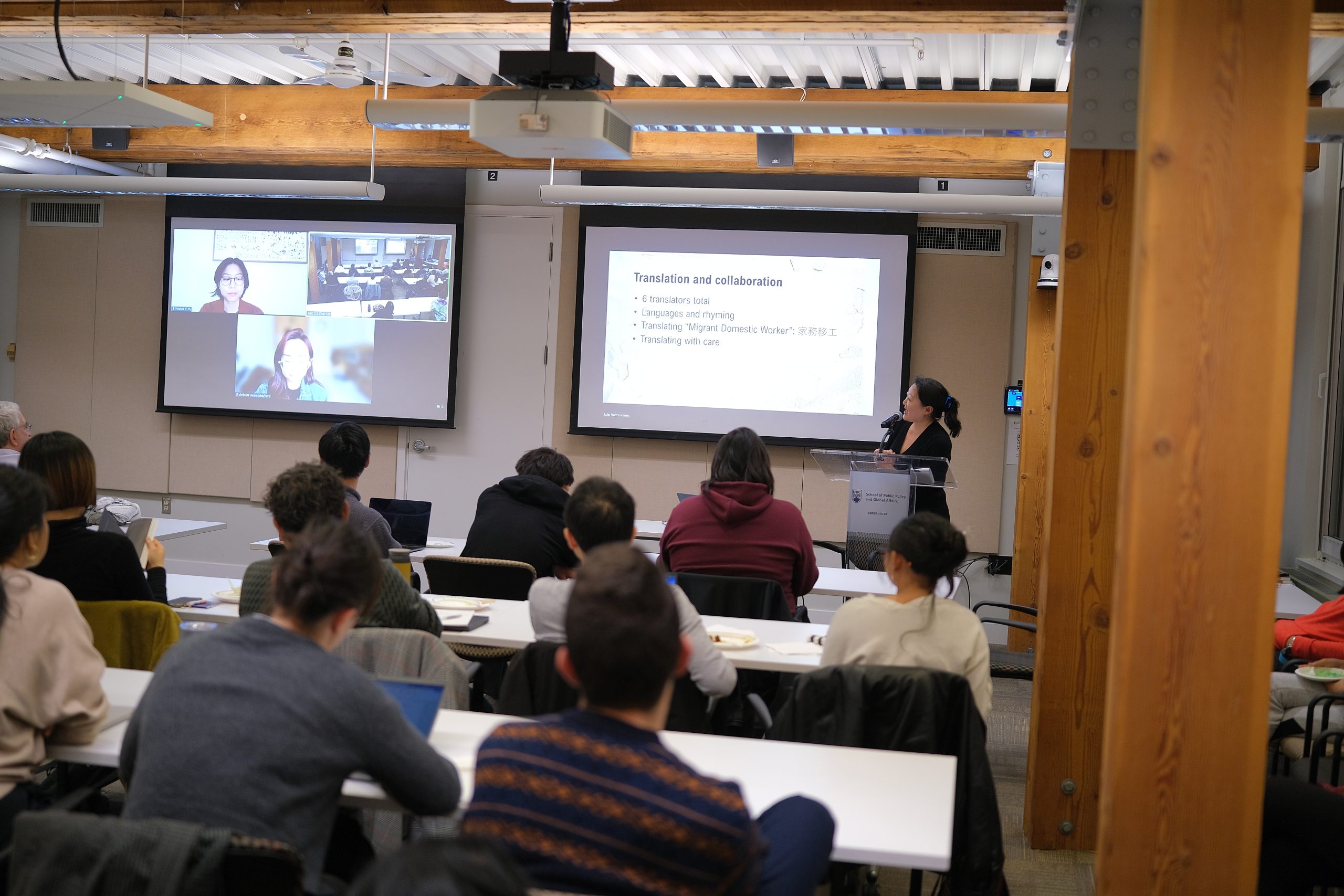
Julie Ham (podium) asks her co-editors Yvonne Yevan Yu (screen, top left) and Christine Vicera (screen, bottom) to share thoughts on the collaborative translation and editing process for the poetry anthology Ingat. (image credits: Si Ming Zheng)
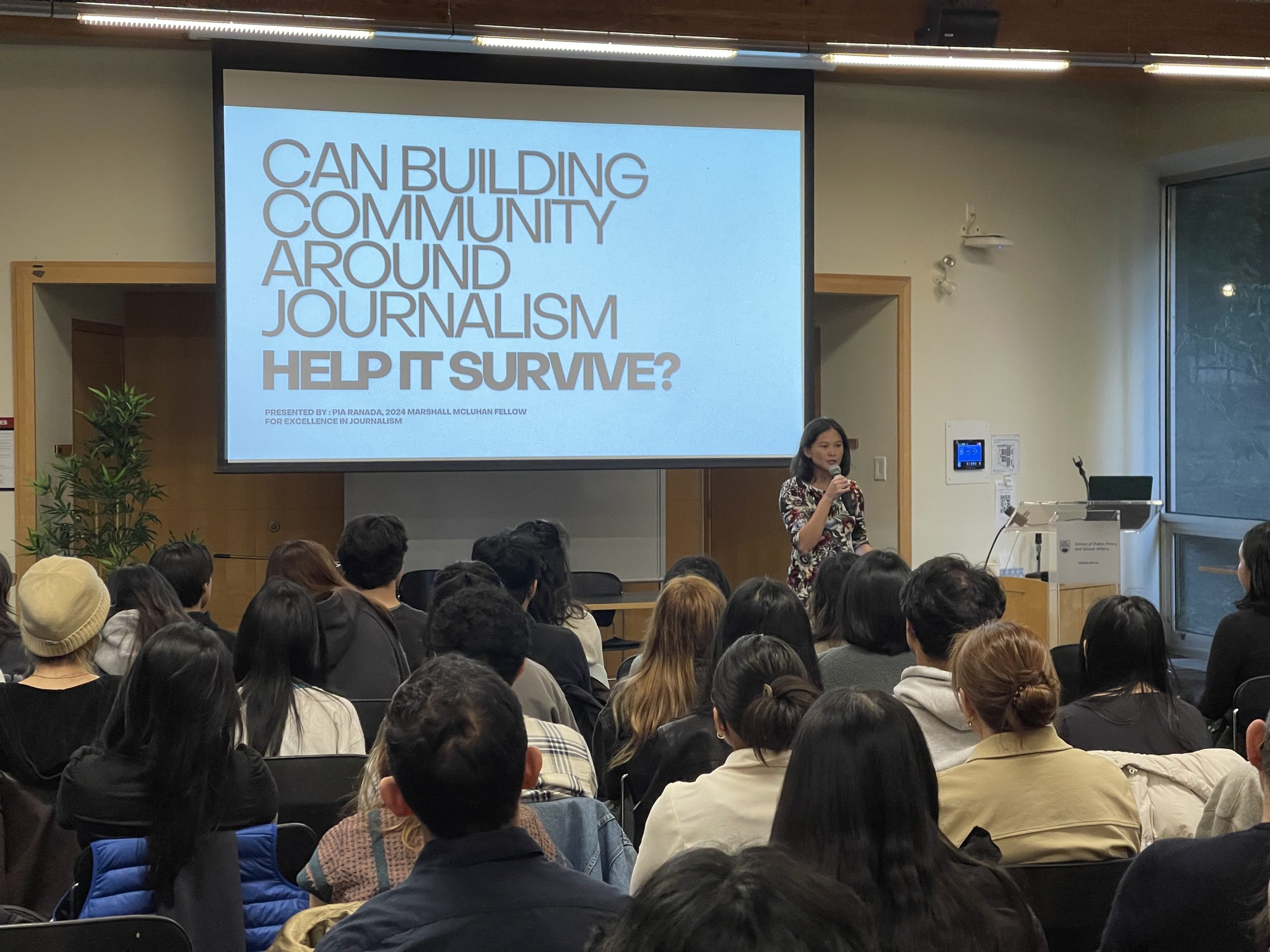
2024 Marshall McLuhan Fellow (Philippines) Pia Ranada asks tough questions about how journalism can rebuild itself based on her experience as a reporter for the Philippine news organization Rappler and her recent study tour of Canadian newsrooms. (image credits: Quinton Huang)
The academic year unfortunately ended with two tragedies: the 7.7-magnitude Sagaing earthquake in Myanmar and the senseless attack at the Lapu-Lapu Day Block Festival in Vancouver. Our community members, particularly those from the Burmese and Filipino communities at UBC and the Lower Mainland, have been deeply affected by these events, and we continue to stand in solidarity with all those impacted. With generous donations from the School of Public Policy and Global Affairs and SPPGA faculty members, CSEAR associates organized a used book sale to support the UBC Myanmar Student Association’s fundraiser for earthquake relief. Our initial sale raised $600 in just two days, while the ongoing self-service book sale in the C.K. Choi Lobby has raised over $1000 since mid-April.
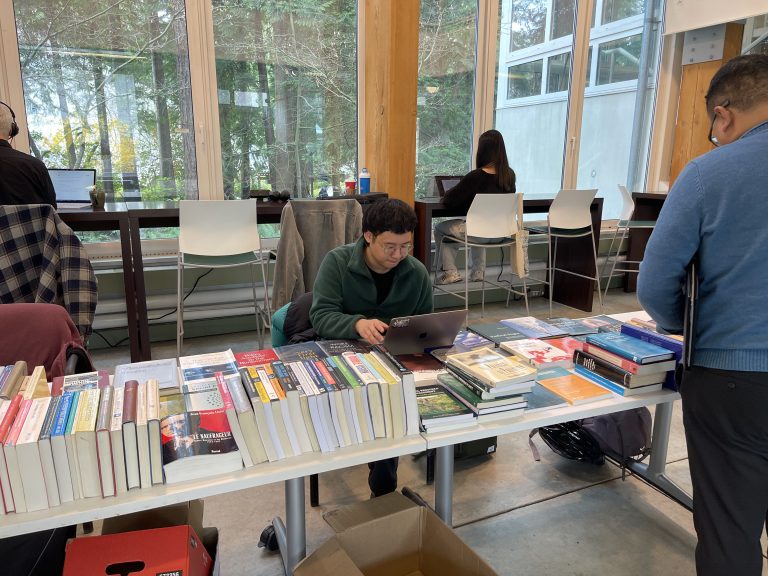

Calvin San tabulates proceeds during the CSEAR associates’ used book sale to support the UBC Myanmar Student Association’s fundraiser for earthquake relief. (image credits: Quinton Huang)
We look forward to continuing these collaborations and conversations as we welcome Prof. Juliet Lu to serve as co-director alongside Prof. John Roosa for the 2025-26 academic year. We also look forward to welcoming scholars from across Canada and around the world for two upcoming conferences—the Canadian Council on Southeast Asian Studies conference (November) and the Association of Asian Studies conference (March)—held in Victoria and Vancouver.
Thank you to everyone who attended a CSEAR event or participated in our community this year. We hope you continue joining us in the future. Finally, we are immensely grateful to our Program Assistant, Quinton Huang, who worked far beyond the call of duty to organize all of the events described above. We will have to bid him farewell in August as he moves to the University of Toronto to continue his graduate studies.


CSEAR Director John Roosa (center right) and Program Assistant Quinton Huang (center left) join a meeting of the minds between Alexander Woodside (left), a founding member of the Institute of Asian Research and CSEAR faculty associate emeritus, and Li Tana (right).


